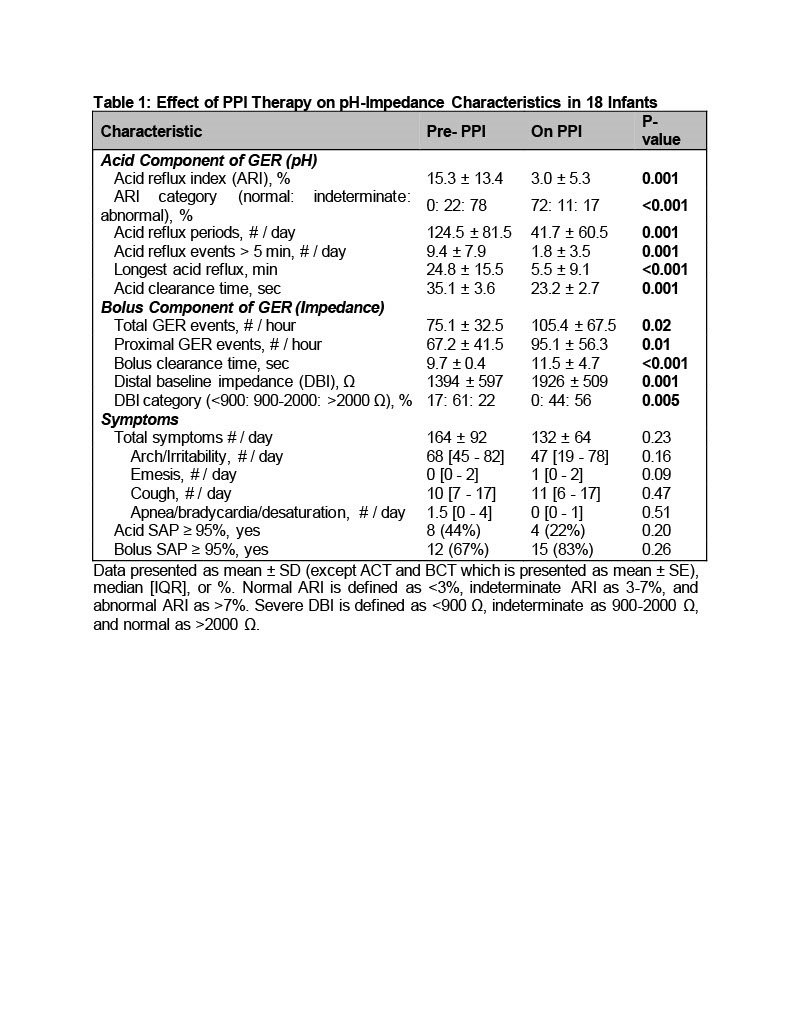Neonatal GI Physiology & NEC
Neonatal GI Physiology & NEC 2: Gut and Liver Health
352 - Effects of Proton Pump Inhibitor Therapy on Symptoms and Esophageal Refluxate Characteristics in Infants: Comparing Pre-treatment vs. During Treatment
Publication Number: 352.134

Zakia Sultana, BA (she/her/hers)
Research Associate
Nationwide Children's Hospital
Columbus, Ohio, United States
Presenting Author(s)
Background: We have shown that bolus clearance and esophageal motility mechanisms worsened after 4 weeks of PPI therapy and washout in infants with evidence of abnormal acid reflux index (ARI). However, the indications for PPI therapy or of its duration remains unclear in infants with gastroesophageal reflux (GER) disease (GERD). It remains inconclusive if PPI resolves symptoms or modifies refluxate characteristics.
Objective: Therefore, our rationale was to examine these characteristics while on PPI therapy. Our aims were to examine data from those infants wherein parents/providers refused to discontinue PPI therapy and we had an opportunity to compare the pH-impedance and symptom characteristics before PPI therapy and while on PPI therapy.
Design/Methods: Infants (N=18, born at 30 ± 0.7 weeks gestation) with ARI >3% were treated with PPI. Longitudinal comparisons were performed between baseline (prior to PPI) and follow-up (on PPI) at 42 ± 1 and 46 ± 1 weeks postmenstrual age respectively. The following characteristics were compared: a) pH (acid) characteristics- ARI, number of acid reflux periods, number of acid reflux events >5 min, longest acid reflux event, and acid clearance time; b) impedance (bolus) characteristics- total number of GER events/hour, proximal GER events/hour, bolus clearance time, and distal baseline impedance (a marker of esophageal inflammation); and c) symptoms- frequency of overall and individual symptoms, and symptom associated probability (SAP) which is a metric to estimate the likelihood of GER components causing symptoms.
Results:
Comparison of 24-hour pH-impedance characteristics at baseline (before PPI use) and while on PPI therapy are shown in Table 1. Note that although PPI reduces the acid-mediated effects of GER (pH characteristics and distal baseline impedance), the bolus components worsened (i.e., frequency of GER events and bolus clearance duration increased). Additionally, continued use of PPI did not reduce the symptoms or esophageal sensitivity to any GER events.
Conclusion(s): We speculate that the use of PPI actually increases the frequency of GER events and worsens clearance mechanisms, thus symptoms remain. Prescription of acid suppressive medications for objectively determined GERD should have a time limit. Prolonged PPI treatment can result in worsening of pharyngo-esophageal motility mechanisms. Specifically, symptoms may be due to co-existing aerodigestive mechanisms, pharyngoesophageal dysmotility, sensory modification, and hyperalgesia. Given the consequences of PPI use in infants, use of placebo in objective-evidence based clinical trials is justified. 
